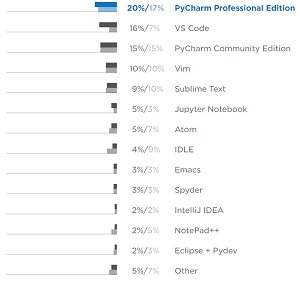News
VS Code Gains Python Developer Mind Share
Much has been written here about how Microsoft's Visual Studio Code dev team has gone "all in on Python," and the effort seems to have paid off according to a new developer survey specifically devoted to the popular programming language.
The Python Software Foundation published its first Python developer survey last year (using 2017 data) and just this week released the Python Developers Survey 2018, which -- in conjunction with JetBrains -- polled more than 20,000 developers from more than 150 countries last fall.
Between those two surveys, usage of the open source, cross-platform VS Code editor skyrocketed.
"Interestingly, VS Code made its way from 7 percent in 2017 to 16 percent in 2018, becoming the second-most popular editor for Python development," the report said. "Most probably because of the rapid growth of VS Code many other editors had a decreased share of users."
PyCharm Professional Edition was the No. 1 choice among Python developers, even when those developers are categorized as being data science developers or Web developers. (This year, data science development overtook Web development for the No. 1 use case among Python developers.)
The following graphics shows the combined data science/Web responses for choice of IDE (or code editor), with 2018 response percentages to left and 2017 response percentages to the right:
 [Click on image for larger view.] Top Editors and IDEs Reported by Both Data Science and Web Developers (source: Python Software Foundation).
[Click on image for larger view.] Top Editors and IDEs Reported by Both Data Science and Web Developers (source: Python Software Foundation).
While the percentage of respondents in the combined category reporting they use VS Code increased from 7 percent in 2017 to 16 percent in 2018, among data science developers, the percentage climbed from 10 percent to 15 percent. Web dev percentages increased from 10 percent to 19 percent.
"Web developers have slightly different editor preferences from data scientists," the report said. "They prefer PyCharm, VS Code, Vim and Sublime text much more than data scientists do, while many data scientists prefer Jupyter Notebook as their primary tool."
Microsoft accelerated its Python efforts way back in 2017 when it hired software engineer Don Jayamanne, who created the most popular extension in the Visual Studio Code Marketplace by far: yes, Python. The VS Code team subsequently sought to hire more Python developers to help with that extension -- now a Microsoft project -- and a dizzying array of other efforts to embrace the language:
Other key takeaways in the new report include:
- Python 3 adoption rate is growing fast and is already at 84 percent, while Python 2 is used as the main interpreter by only 16 percent of Python users. That's a huge jump in popularity for Python 3, from 75 percent in 2017.
- Data analysis has become more popular than Web development among Python users, growing from 50 percent in 2017 to 58 percent in 2018.
- Half of all developers using Python as their main language also use JavaScript. Python is also frequently used together with HTML/CSS, Bash/Shell, SQL, C/C++, and Java.
- Flask and Django are the most popular frameworks among Web developers. Having equal shares (around 45 percent each), they leave other Python Web frameworks far behind.
- NumPy, Pandas, Matplotlib and SciPy are the most popular data science frameworks and libraries. Machine learning-specific libraries such as SciKit-Learn, TensorFlow, Keras, and others are also quite popular.
- In 2018, significantly more respondents reported being involved in DevOps (an increase of 8 percentage points compared to 2017).
- PyCharm with its two editions is the most popular tool for Python development. Interestingly enough, VS Code has expanded from 7 percent in 2017 to 16 percent in 2018, making it the second most popular editor for Python development. Other popular editors for Python include Vim, Sublime and Jupyter Notebook.
- Surprisingly, almost two-thirds of Python developers choose Linux as their development environment OS.
For more about the survey see this blog post.
About the Author
David Ramel is an editor and writer at Converge 360.